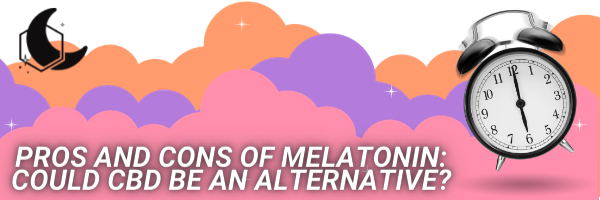
Pros and Cons of Melatonin: Could CBD Be An Alternative?
Millions of people say they need more sleep and are turning to over-the-counter sleep aids like melatonin for help. Americans spent over $400 billion on melatonin in 2017. While some people are finding short-term relief, melatonin is not translating to more or improved sleep for most. Here’s what you need to know about how melatonin works in the body, its effectiveness, and the side effects.
What is Melatonin?
Melatonin is a hormone that is naturally secreted by the brain’s pineal gland. Its job is to regulate the body’s circadian rhythm and keep our 24-hour internal clock’s sleep/wake schedules on time. Melatonin is not a sleep initiator, meaning it will not make you go to sleep. It works in conjunction with the sun. Its levels rise when it gets dark in the evening a few hours before our bodies are ready for sleep and helps the body shift into a calm state. Melatonin levels continue to rise in the middle of the night and then gradually wane towards morning as the sun starts to rise. Exposure to light in the middle of the night can impact melatonin, telling your body that it’s time to wake up before your body is ready.
Effectiveness of Melatonin
According to Consumer Reports, 86% of people surveyed said melatonin was the sleep supplement they used, but only 25% said they got a great night’s sleep after taking it. Melatonin helped people fall asleep only seven minutes faster than a placebo. The Consumer Reports survey found people are not taking melatonin as directed. Many take more than the recommended dosage. Sleep experts say less is more. MIT researchers recommend .3 to 1.0 mg. Most OTC forms of melatonin contain three to ten times that much! Melatonin should never be administered before operating a vehicle or heavy machinery. For circadian rhythm disorders (improper beating of the heart, whether irregular, too fast, or too slow), it should only be taken short term meaning less than three months. There is little data to show melatonin is safe or effective beyond three months.
Side Effects of Melatonin
Supplements need to be carefully considered and have side-effects that can rival medications. As melatonin is a hormone, it plays a role in directing the body’s functions. Taking melatonin is not the same thing as taking vitamins and herbs. The side effects include:
- Headaches
- Nausea
- Next-day grogginess which can impact morning driving
- Hormone fluctuations
- Vivid dreams and nightmares
- Restless leg or heavy limbs
Who Should Use Melatonin?
The body makes melatonin naturally, which differentiates it from other types of supplements people use for sleep like lavender or magnesium. The American Academy of Sleep Medicine says typically only people who have a true melatonin deficiency need to supplement it. A blood, urine, or saliva test can show if a person has a deficiency.
There are conditions where supplemental melatonin is used to help people override their natural sleep rhythms, these are called Circadian Rhythm Disorders. Circadian Rhythm Disorders include conditions like shift work or jet lag where people sleep enough, but not when the body is naturally programmed to sleep. Supplemental melatonin provides a burst of melatonin to the brain, which then leaves the system rapidly instead of a more natural and gradual build-up overnight.
Invest in Better Sleep for the Long Term
Sleep researchers suggest people focus on their sleep behaviors for long term success in getting better sleep. To improve melatonin function and production, it is important to get natural sunlight during the day and then keep your space dark as you wind down for sleep. Cutting caffeine in the afternoon and avoiding other stimulants such as alcohol before bed can also help.
Some doctors recommend:
- Going to bed when you’re tired
- Turning off all blue and green light devices such as phones, tablets, and TVs a couple of hours before you want to sleep
- Getting sunshine during the day can help your melatonin production
- Find a suitable temperature for your best sleep
CBD as an Alternative?
People have used cannabis to support sleep habits for centuries. Chinese Medical texts dating back to the 12th-century detail using hemp for health benefits.
Consumer Reports talked to Joseph Maroon, M.D., a neurosurgeon at the University of Pittsburgh Medical Center who researches the effects of cannabis on the brain. Dr. Maroon suggested to Consumer Reports, to think of CBD as a natural alternative for anxious thoughts that can keep us up when it’s time for sleep. Dr. Maroon also suggests people talk to their doctor before starting any kind of sleep treatment.
A 2017 review of studies in the medical journal Current Psychiatry Reports suggests CBD may directly impact sleep by the way it interacts with receptors in the brain that govern sleep cycles. The human body has a natural endocannabinoid system with receptors that affect the body’s natural sleep and wake cycle. The endocannabinoid system and circadian rhythms regulate our ability to fall asleep, stay asleep, and wake up feeling rested.